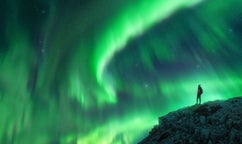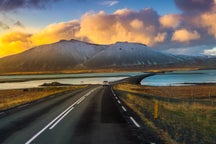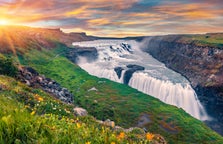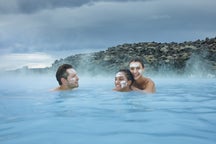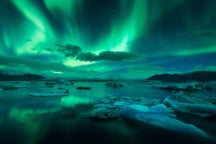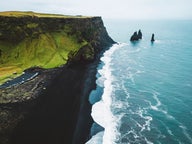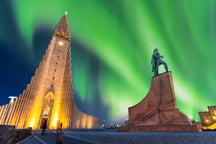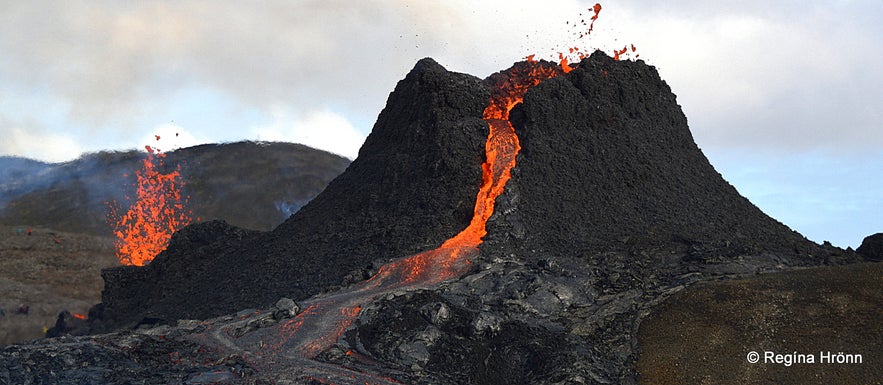
After 3 weeks of almost constant earthquakes, approximately 40,000 of them to be exact, which were driving us crazy here on the south-west corner of Iceland, we finally got a volcanic eruption at Geldingadalir by Mt. Fagradalsfjall on the Reykjanesskagi peninsula.
A crater opened in Geldingadalir, which spewed out primitive molten lava 17 km from the Earth's mantle, something that is quite out of the ordinary - but then this volcanic eruption is out of the ordinary, as there has not been a volcanic eruption in this location for some 6,000 years!
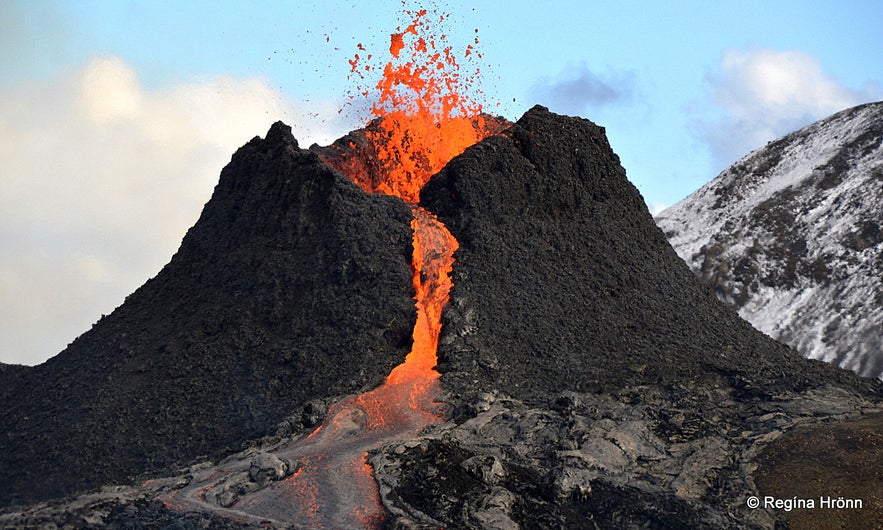
The volcanic eruption
When I say we finally got a volcanic eruption, I don't mean we wanted one in this location so close to the international airport.
The earthquakes were so frequent that they made many of us seasick and scared the living daylight out of us.
The first earthquake on the 24th of February was 5.7 on the Richter scale, and we could feel it all too well in the Great-Reykjavík area, which is 30 km away from the eruption, not to mention the people living on the Reykjanesskagi peninsula.
A series of smaller earthquakes followed, and the nation was glued to the Met Office webpage, which showed the size and location of each.
The webpage crashed multiple times while we checked the magnitude of the latest earthquake we felt.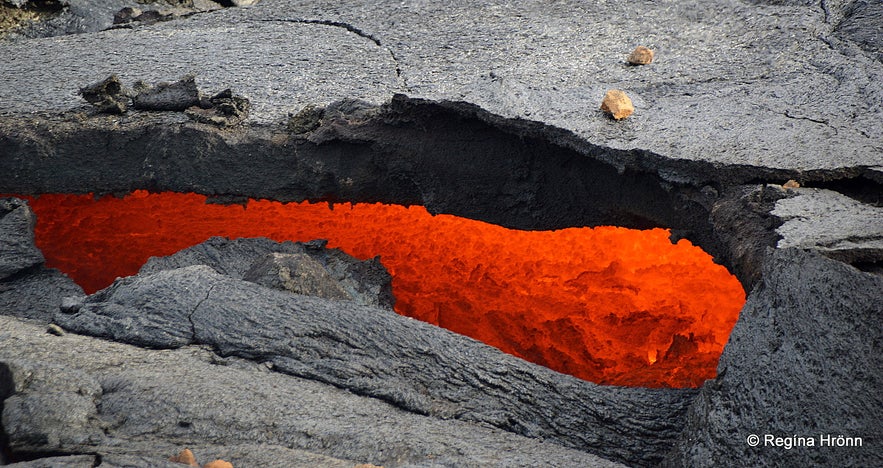
Hot lava flows beneath the lava
Then the geologists told us we might be facing a volcanic eruption!
We didn't know what was going on, as we had never experienced volcanic eruptions in this part of Iceland in our lifetime.
We are well aware that there are many volcanoes and lava fields on the Reykjanes peninsula. But to us, that was ancient history with ancient lava fields. The last volcanic eruption on the Reykjanes peninsula was some 800 years ago.
I packed a bag with my medications and extra clothes and slept fully dressed for the first few days of the earthquakes, just to be prepared for the worst-case scenario. And I know a lot of people on the south-west corner who did the same thing.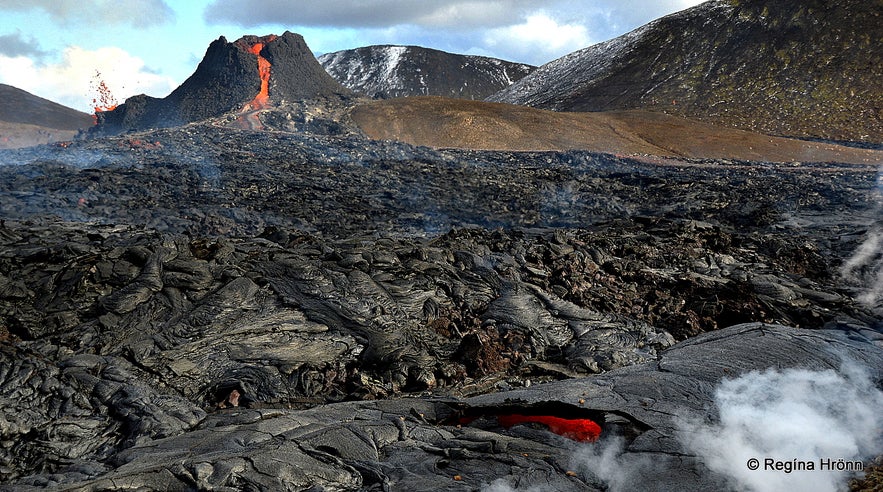
The volcanic eruption and the new lava field
The geologists told us that magma was trying to find its way out, which would most likely cause a volcanic eruption, but we didn't know where or when. But when the magma would find an outlet, then most of the earthquakes caused by it would stop.
It was a bit nerve-racking waiting for the eruption, and there were many speculations about where and when, or even if, it would erupt.
Then, on a Friday night on the 19th of March, while we were watching the telly, we saw on a live Icelandic show that a volcanic eruption had started - some 40 minutes earlier! We jumped from the sofa and panicked a bit, which I guess is just normal behaviour when you live close to a volcano.
I cannot even begin to imagine, though, how the people of the nearby town of Grindavík felt.
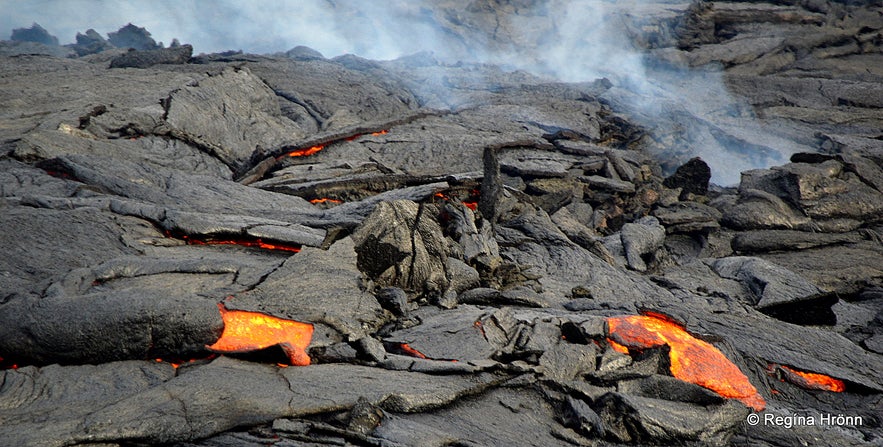
The new lava field is in the making
Then there was a news broadcast with breaking news: a volcanic eruption has started by Mt. Fagradalsfjall in the Geldingadalir valleys! I had heard of Mt. Fagradalsfjall but never of the Geldingardalir valleys. Now every Icelander knows where the Geldingadalir valleys are located.
And we were told that this was the best location for the magma to escape, as it were, for a volcanic eruption to take place, as it was far from inhabited areas - 3 km away from Grindavík town. And in a valley, which would keep the lava flow in check, at least for a while, until the valley would fill up.
There had been so many speculations about where and if there would be a volcanic eruption, and if it would flow to the sea or over Suðurstrandarvegur road. Now, at least it was in a good place, so to speak, actually the best possible place.
And it was a small eruption, they said, a wretch (ræfill) really (their words). At least compared to the Eyjafjallajökull eruption back in 2010. This one would not stop any air traffic for sure.
Then the nation began flocking to see the small volcanic eruption.
The nation went wild, and even inexperienced hikers in sneakers and jeans were hiking to see the volcano, as if it were a short walk rather than hours over rough terrain to witness a volcanic eruption.
It was beautiful watching the headlights of people visiting the volcano at night, creating a long, lit-up line that looked like a pearl necklace.
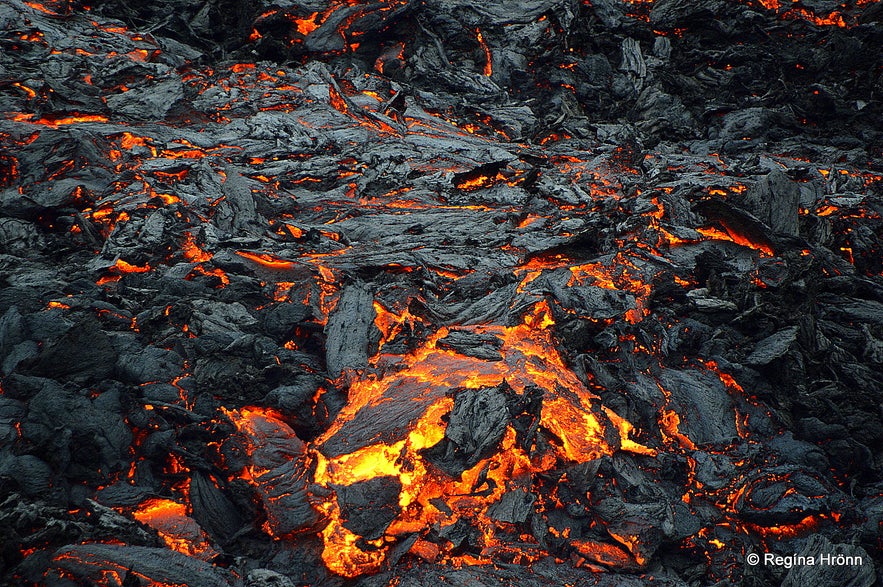
Hot lava
Many helicopters were flying over the volcano. Finally, after a prolonged epidemic drought, helicopter companies were busy, and people stood in line to fly over the eruption site.
And I can tell you that I was tempted to do the same instead of hiking to the volcano. A bit expensive though, as helicopter rides go, but it must be a breathtaking experience.
Finally, on the 23rd of May, after 7 weeks of waiting for a helicopter tour, it was my turn. I have told you about it in my next travel blog: A Helicopter Ride to the Volcanic Eruption in Mt. Fagradalsfjall in SW-Iceland
Here is a video I took on that tour when we landed on Mt. Stóri-Hrútur:
On the first days of the eruption, the hike to the volcano was 3 hours, first on Suðurstrandavegur road, which was closed due to cracks in the road caused by the earthquakes, and then over rough terrain.
A 3-hour hike one way in the middle of March in cold weather!
The police and the rescue teams had to rescue several people who were exhausted and had lost their way.
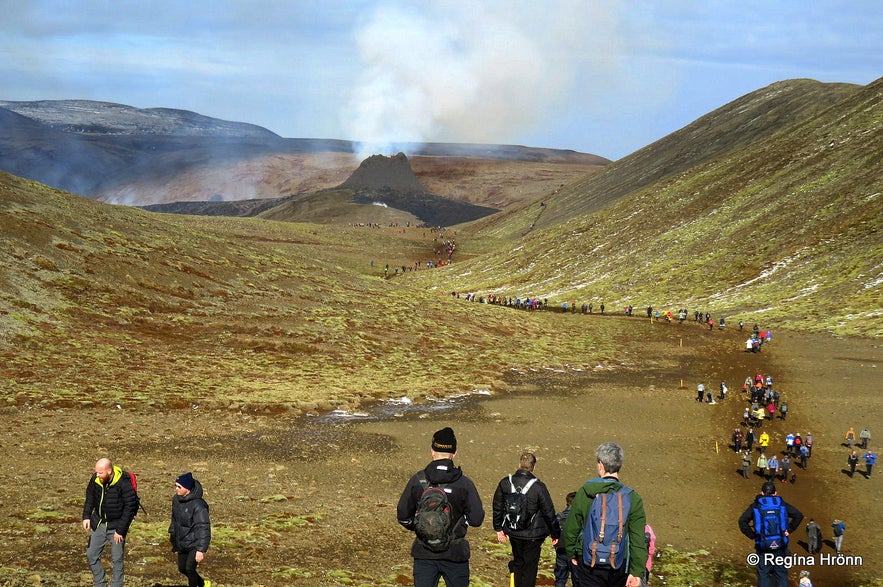
People flocking to see the volcanic eruption
Then the rescue teams set up a track with marker posts, making it easier for the crowds to see the volcanic eruption.
The hike was approximately 3.5 km, which is 1.5 hours one-way, depending on how fast you walk and how far from the track you can find parking.
When the wind changes, the gases can reach the track, and the track is either closed down completely or another track is opened. The rescue teams are volunteers doing their utmost to keep us safe. 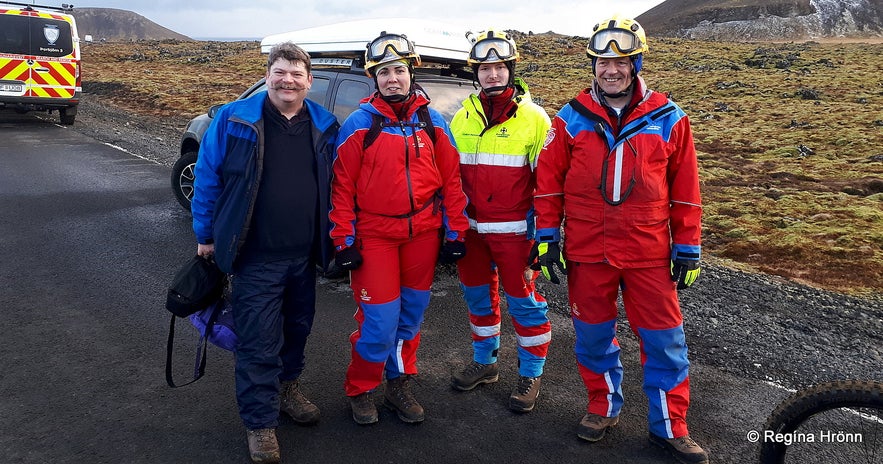
My husband got a photo with the rescue team :)
Kudos to them for a job well done, but they cannot do this forever. They have families and work to go to, and they must be pretty exhausted by now.
Especially after trying to find lost people in bad weather and keeping the track closed when we have blizzards or when there is too much poisonous gas from the volcano along the track.
People have tried to enter the area when it is closed, making it even more difficult for rescue teams. And then some tourists who were supposed to be in quarantine came straight from the airport to see the volcano, sic.
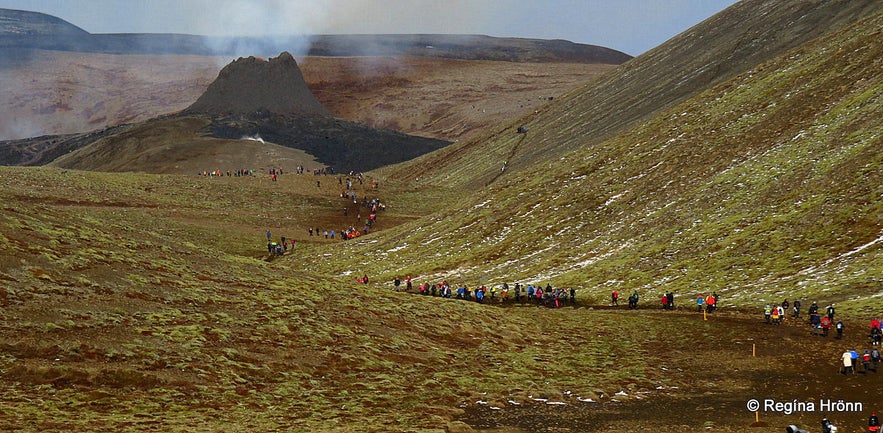
People flocking to see the volcanic eruption
And now the police and the epidemiologists were starting to worry about COVID being spread by such a large group of visitors hiking to the volcanic eruption. As more than a thousand visitors were flocking to see the volcano every day, they were all touching the same rope on the track.
We were asked to stay away from the eruption, but, given human nature, we were also advised to carry a disinfectant if we couldn't stay away and to disinfect our hands before and after touching the rope.
We were advised to maintain a 2-metre distance. And to wear masks near the volcano to prevent the virus from spreading. These masks don't help with poisonous gases, though.
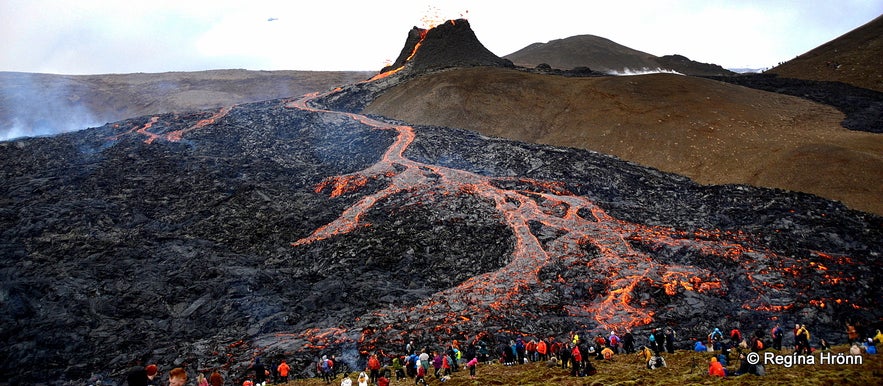
People watching the lava flow from a hill close by
In the first days of the eruption, people were getting way too close to the spewing crater, and I was watching in disbelief on the telly, where we had a live broadcast from the volcanic area, how some people seemed to be oblivious to the fact that this was a danger zone and not a playground.
I saw that a whole group of people was walking up the slope by the crater, but then I saw them coming down again, as somebody must have warned them of the danger. Only a minute later, they were up the hill again and taking selfies right next to the crater!
Were they out of their minds? The crater walls can collapse at any given moment with the 1200 degrees C hot magma flowing from it in a new direction. There is no escape from that, and here, people were having fun staring right in the face of danger. 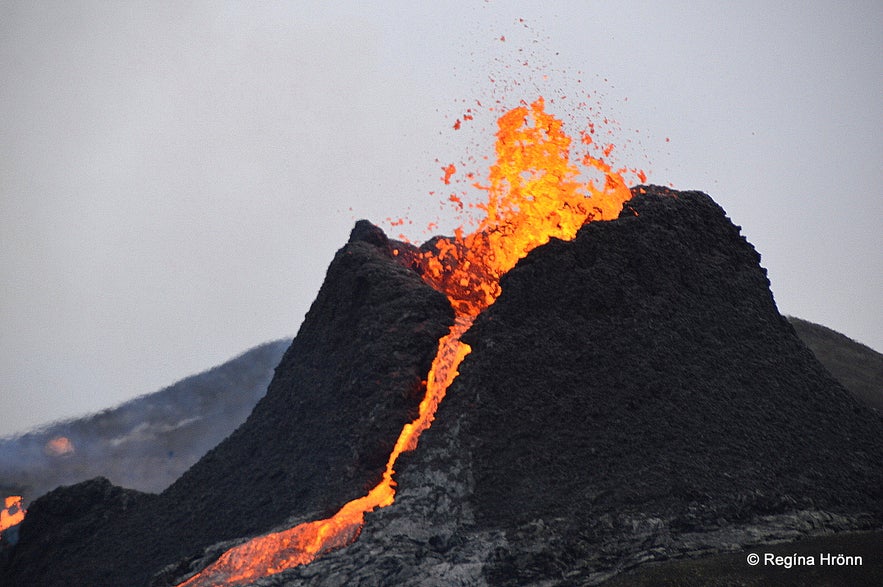
The volcanic eruption
The following day, access to the crater had been closed. And sure enough, the walls of the crater collapsed with hot magma spewing out of it in new directions.
More and more people came to see the eruption, some cooking food on the cooled lava and others lying down on it. I say, don't ever do that, as the new lava breaks easily, and there is most likely molten lava beneath it.
The new lava is very sharp and can cut through clothing and the soles of shoes, causing deep wounds.
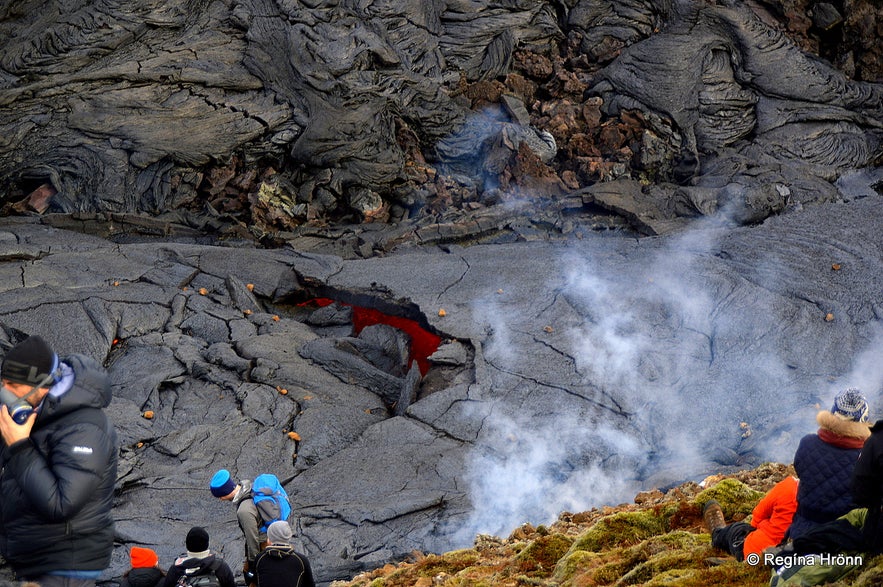
People at a safe distance on a hill above the lava flow
One Icelandic tour guide took his clothes off and had his nude photos taken by the volcano.
But most people were behaving normally, and most Icelanders at least know the dangers we can face during volcanic eruptions, like the poisonous gases which can kill you in an instant.
These gases gather in depressions, and they cannot be seen ... so don't go too close.
Stay at a safe distance and use the zoom to get close-up photos.
If you want to visit this volcano, dress warmly and in woollen clothes beneath your parka. Wear a hat, scarf, and gloves. Good hiking shoes are essential; when the path is icy, crampons are required.
It is also a good idea to bring walking sticks and suitable protective clothing in your backpack. Wet tissues and a sealable bag are required, as there is no toilet on site.
Bring something to drink and some food. But always take everything with you when you return, leaving nothing behind.
The police and rescue teams are shocked to see how much trash some people leave behind in nature, and even alcohol bottles are left behind, meaning that some people are drinking by the lava flow.
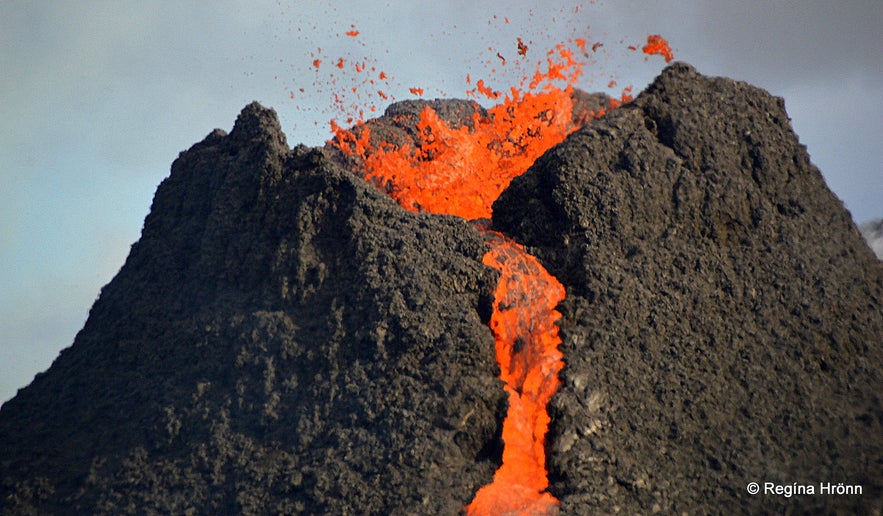
The volcanic eruption
Stay at a safe distance from the volcano and zoom in on it.
And stay away from the edge of the lava. There is molten lava beneath it, and the edge can break, resulting in the lava flooding out at considerable speed, one of our geologists said. We certainly don't want people to be injured by the volcano.
My husband visited the volcano on the 23rd of March and took the photos in my travel blog. On the following day, the 24th of March, which is my birthday, he gave me the pictures and a new lava rock from the eruption as a birthday present :)
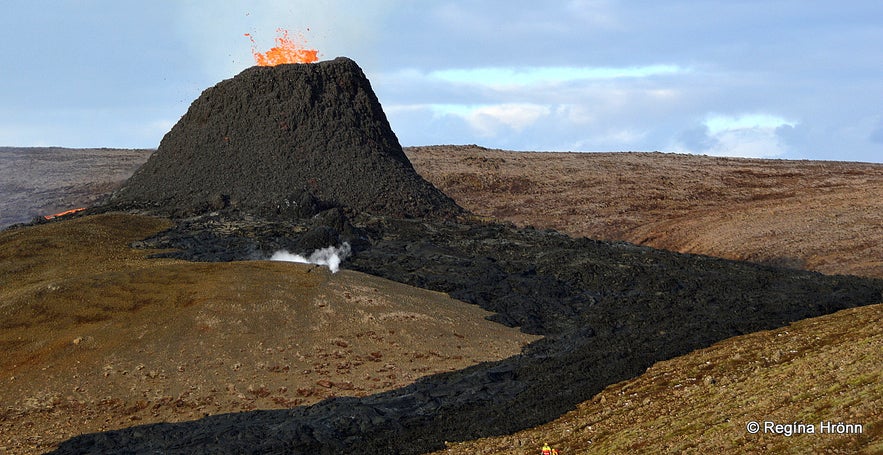
The volcanic eruption
The volcano is forever changing, and a new vent has opened next to the big one, bringing the total to nine vents along the same volcanic fissure.
And in the new lava field, from time to time, you can see beautiful lava lakes. This is quite an extraordinary and thrilling experience. But at the same time, it is hazardous to stand too close to the lava.
Reykjavík Excursions began transporting people in their big buses to the start of the hike. I was glad they were finally seeing business, as the tourism industry had suffered significantly during the pandemic.
But the following day, new COVID restrictions were announced: our kids were suddenly falling ill with the British COVID variant, which halted the big buses shuttling passengers to this area, but smaller buses were allowed, with departures twice a day. 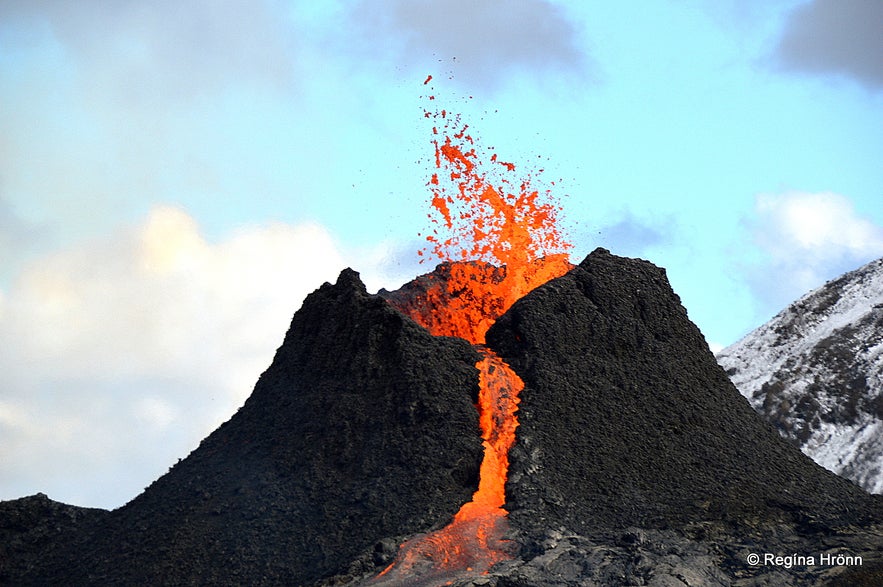
The volcanic eruption
A parking lot was added on the 28th of March; previously, people parked along the road. The changes are so quick that I can barely keep up with them. Again, kudos to the police and the rescue teams.
We don't know how long the volcanic eruption will last or whether there will be additional eruptions in this area after this one, which hasn't even been named yet. This might be the beginning of a new era in the southwest corner of Iceland, or the eruption can fade soon; nobody knows.
Please don't stop in front of the camera; it is extremely annoying and damaging. Scientists and geologists use the recordings to see the development of the volcanic eruption.
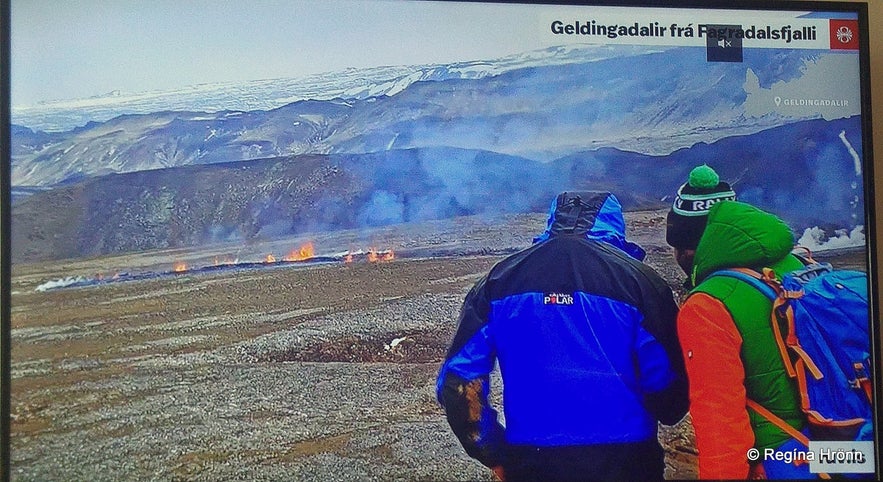
Please don't stand in front of the camera, or dance and wave
We are recording live history here, and having people blocking the camera with stupid dancing and waving is very frustrating.
On the 5th of April, new fissures opened up in Meradalir, and the track was moved so that the most challenging part of the hike, the hill with the rope, was bypassed.
And a month later, the volcano started behaving strangely: only 1 of 6 vents became active, then stayed silent for a while, and then erupted high into the air, so it started acting more like a geyser, really.
In May, the new lava field got the name Fagradalshraun lava field, which is a pretty name- the Lovely valley lava field :)
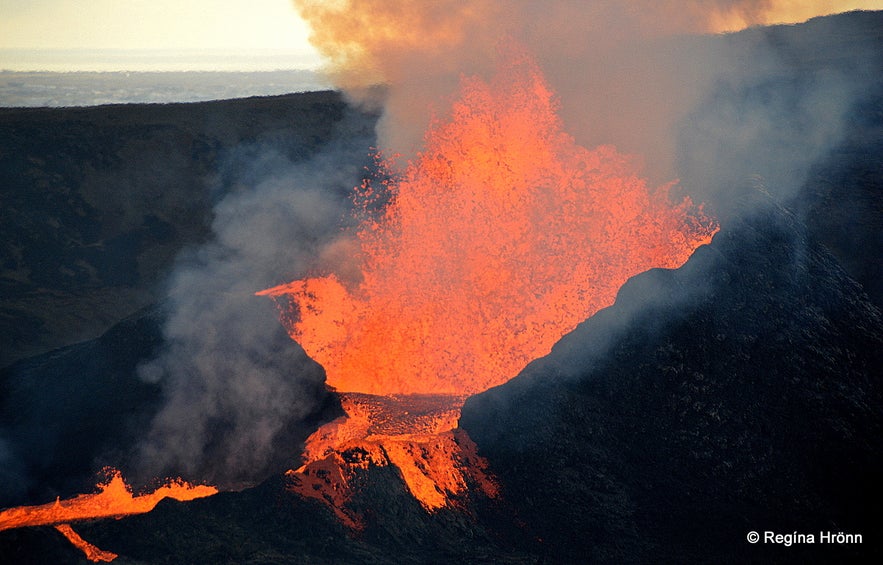
Photo taken of the eruption in May 2021
The earth is a living creature and never ceases to amaze us, that is for sure.
Here is a virtual tour of the hike to the volcano.
Before hiking to the volcano, always check the eruption site conditions at Safe Travel.
The Reykjanes Peninsula is a UNESCO Global Geopark. If the volcanic eruption lasts, it might become the biggest tourist attraction on the peninsula, alongside the Blue Lagoon.
Have a lovely time in Iceland and be safe :)







